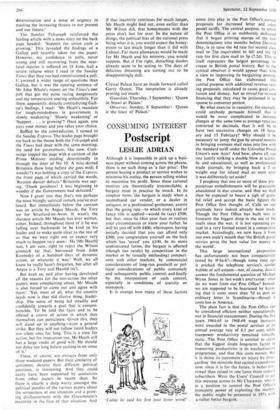CONSUMING INTEREST
Postscript
LESLIE ADRIAN
Although it is impossible to pick up a busi- ness paper without coming across the phrase, there is no such thing as 'a fair price'. The person buying a product or service wishes to minimise his outlay, the person selling wishes to maximise his profit. Since these rational motives are theoretically irreconcilable, a bargain must in practice be struck. In its simplest form, 'the bargain is made when a secondhand car vendor, or a dealer in antiques, or a professional gentleman, asserts that the going rate—to which every kind of fancy title is applied—would be (say) £500, but that, since he likes your face or realises your circumstances or knew your father, he will let you off with £400; whereupon; having initially decided that you can afford only £300, you congratulate yourself on the luck which has 'saved' you £100. In its more sophisticated forms, the bargain is affected (though too rarely) by competition in the market or by (usually misleading) compari- sons with other markets; by commercial considerations of long-run goodwill or pol- itical considerations of public contumely and subsequently public control; and finally by the interposition of such control, especially in conditions of scarcity or monopoly.
It is strange how many of these factors come into play in the Post Office's current proposals for increased letter and other postal tariffs. The central purpose, to which the Post Office is so stubbornly dedicated that it began printing stamps of the new denominations nine months before Decimal Day, is to raise the 4d rate for second class mail to 2fp (equivalent to 6d) and the 5d rate for first class mail to 3p (7.2d). This in itself represents the largest percentage in- crease in British postal history. But to the cynical observer it would appear that, with a view to improving its bargaining posture, the Post Office has elaborated this central purpose with additional revenue rais- ing proposals, calculated to cause great con- fusion and dismay, but so trivial for its own financing that they may be jettisoned in re- sponse to consumer protest.
By what exercise in casuistry, for example, could anybody persuade himself that it would be more complicated to increase charges at the same time as postage rates are converted to decimals, than it will be to have two successive changes on 18 Janu- ary and 15 February? Why should it be necessary to jump the gun by several months in bringing overseas mail rates into line with the standard tariff under the Universal Postal Union's new Acts? And how, above all, can one justify striking a double blow at scienti- fic and educational, as well as professional trade journals, by bringing back a 2 oz weight step for inland mail so soon after it was deliberately set aside?
I prophesy that one or more of these pre- posterous embellishments will be graciously abandoned in due course, and that we shall then be expected to heave a sigh of grate- ful relief and accept the basic figures the Post Office first thought of. Calls on our gratitude have indeed already been made. Though the Post Office has built into its forecasts the biggest drop in the use of the mails since the war, it is not operating ex- cept to a very limited extent in a competitive market. Accordingly, we now have it from our own mule's mouth that 'the British postal service gives the best value for money in the world'.
This large international proposition has unfortunately not been comparatively tested by Which?—though some time ago it pricked the telephone service's similar bubble of self-esteem—nor, of course, does it answer the fundamental question of Michael Wynn Jones in last week's SPECTATOR: what do we want from our Post Office? Instead, we are supposed to be heartened by know- ing that it costs more than 7d to post an ordinary letter in Scandinavia—though it costs less in America.
The plain fact is that the Post Office can be considered efficient neither operationally nor in financial management. During the five years 1964-65 to 1968-69 wage increases were awarded in the-postal services at an annual average rate of 6.1 per cent, while manpower productivity remained virtually static. The Post Office is entitled to claim that the biggest single long-term factor in improving productivity is its mechanisation programme. and that this costs money. But it is doing its customers an injury by disre- garding the principle that capital expenditure now. since it is for the future, is better h c- rowed than raised in one lump from tod, subscribers. Were the Users' Council to get this message across to Mr Chataway, who in a position to control the Post Office's monopoly power of exploiting the market. the public might be presented in 1971 with a rather better bargain.














































 Previous page
Previous page